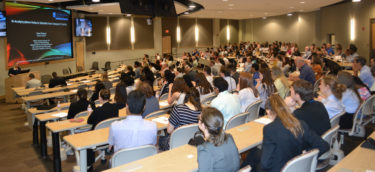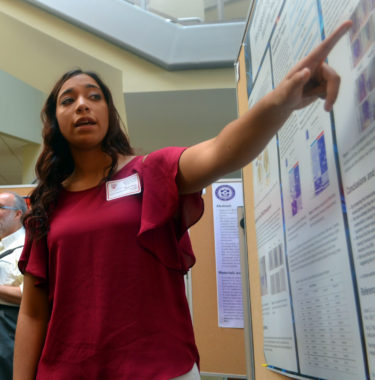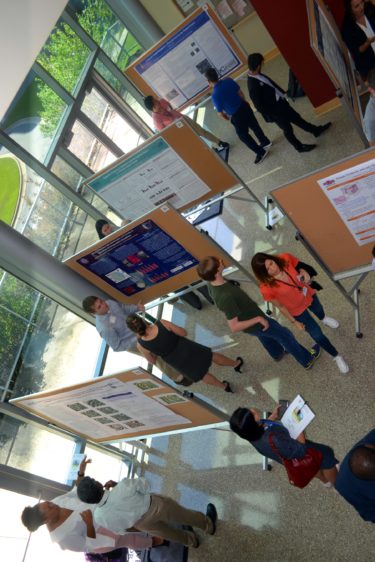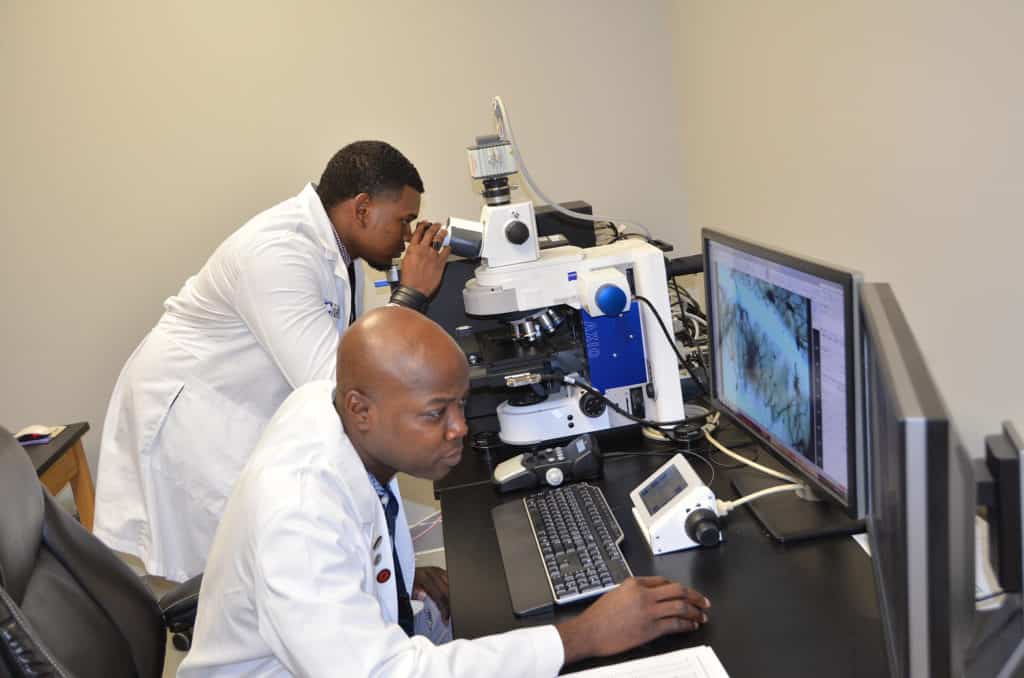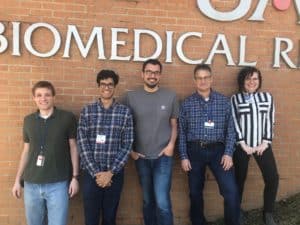Alicia Byrd, Ph.D.
Assistant Professor
Department of Biochemistry and Molecular Biology
UAMS College of Medicine
Research Interest Statement
DNA damage occurs tens of thousands of times per day in human cells from both endogenous and environmental sources. In order to preserve the genetic material, cells have evolved multiple mechanisms to detect and repair DNA damage. Mutations in genes encoding proteins involved in the DNA damage response result in a variety of DNA repair syndromes, which have increased risks of cancers, often in childhood. However, inaccurate DNA repair can also cause genomic instability such as chromosomal rearrangements and expansion of repetitive sequences, which can lead to the development of cancer.
My research focuses on the enzymes that regulate the DNA damage response, in particular, a family of enzymes called helicases that remove secondary structures from DNA. These proteins have critical roles in DNA repair and loss of activity results in genomic instability and predisposition to many types of cancer. The molecular mechanisms of these proteins, both individually and as components of multi-protein complexes, are of interest, as are the effects of posttranslational modifications on their activity. Increased understanding of the regulation of these DNA repair processes that are critical for maintaining genomic integrity could ultimately lead to the design of better cancer therapies.
Dr. Byrd’s Grants
Winthrop P. Rockefeller Cancer Institute
Seeds of Science Pilot Award
Regulation of the DNA Damage Response in Breast Cancer
2/1/19 – 1/31/20
$15,000*
NIGMS – 3 R35 GM122601-03S1
Functions and Mechanisms of Helicases and G-Quadruplex Nucleic Acids
5/01/2017-4/30/2022
Role: Co-I (Kevin Raney, PI)
$129,583*
*cancer-related annual direct costs
Dr. Byrd’s UAMS Collaborators
Stephanie Byrum, Ph.D. (Department of Biochemistry and Molecular Biology)
Robert Eoff, Ph.D. (Department of Biochemistry and Molecular Biology)
Kevin Raney, Ph.D. (Department of Biochemistry and Molecular Biology)
Samantha Kendrick, Ph.D. (Department of Biochemistry and Molecular Biology)
Justin Leung, Ph.D. (Department of Radiation Oncology)
Nirmala Parajuli, DVM, Ph.D. (Department of Pharmacology and Toxicology)
Dr. Byrd’s External Collaborators
Mark Dillingham, Ph.D. (University of Bristol)
Opportunities for Collaboration
I am just beginning my independent research program at UAMS and welcome new collaborations. My primary area of interest is the DNA damage response, but anything related to genome maintenance interests me. My lab has expertise in enzymology, protein-DNA interactions, and G-quadruplex DNA, and we are particularly interested in breast cancer.
You May Not Know That …
I have visited 48 of the 52 Arkansas State Parks with my family on a geocaching adventure. Petit Jean is my favorite so far, but stay tuned; we have four parks left to see.
Recent Cancer-Related Publications
Gao J, Byrd AK, Zybailov BL, Marecki JC, Guderyon MJ, Edwards AD, Chib S, West KL, Waldrip ZJ, Mackintosh SG, Gao Z, Putnam AA, Jankowsky E, Raney KD. (2019) DEAD-box RNA helicases Dbp2, Ded1 and Mss116 bind to G-quadruplex nucleic acids and destabilize G-quadruplex RNA. Chem Commun (Camb). 55, 4467-4470.
Marecki, JC, Aarattuthodiyil S, Byrd AK, Penthala NR, Crooks PA, Raney KD (2019) N-Naphthoyl-substituted indole thio-barbituric acid analogs inhibit the helicase activity of the hepatitis C virus NS3. Bioorg Med Chem Lett. 29, 430-434.
Byrd AK, Bell, MR, Raney KD (2018) Pif1 helicase unfolding of G-quadruplex DNA is highly dependent on sequence and reaction conditions. J Biol Chem. 293, 17792-17802.
Byrd AK and Raney KD (2017) Structure and function of Pif1 helicase. Biochem Soc Trans. 15, 1159-1171.
Griffin WC, Gao J, Byrd AK, Chib S, Raney KD. (2017) A biochemical and biophysical model of G-quadruplex DNA recognition by positive coactivator of transcription 4. J Biol Chem. 292, 9567-9582.
Byrd AK, Zybailov BL, Maddukuri L, Gao J, Marecki JC, Jaiswal M, Bell MR, Griffin WC, Reed MR, Chib S, Mackintosh SG, MacNicol AM, Baldini G, Eoff RL, Raney KD. (2016) Evidence that G-quadruplex DNA Accumulates in the Cytoplasm and Participates in Stress Granule Assembly in Response to Oxidative Stress. J Biol Chem. 291, 18041-57.



